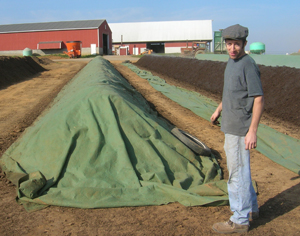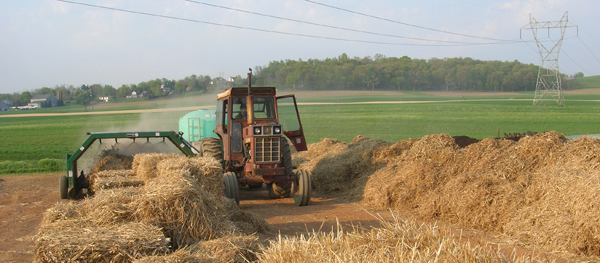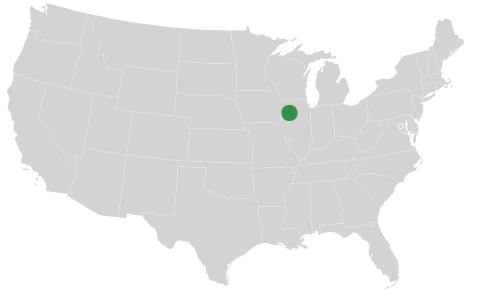 Because of its high feed value alfalfa is one of the most important feed crops grown in the U.S. With the price of commercial fertilizer on the rise, some farmers have turned to high-quality compost as an on-farm alternative to boost their alfalfa yields, improve their fertilizing practices, and reduce their dependence on external inputs.
Because of its high feed value alfalfa is one of the most important feed crops grown in the U.S. With the price of commercial fertilizer on the rise, some farmers have turned to high-quality compost as an on-farm alternative to boost their alfalfa yields, improve their fertilizing practices, and reduce their dependence on external inputs.
For alfalfa crops, feed quality is just as important as the per-acre yield. When a Pennsylvania farmer began applying extracted humus compost tea to his alfalfa, he saw a noticeable increase in the quality of his hay. His most impressive crop tested with a relative feed value of 293, more than 100 points above a normal, “good,” levels!
Bringing Humus Compost to Pennsylvania
Young Pennsylvania farmer Jonathan Keller trained for three years as an intern with Midwest Bio Systems, where he studied directly under Midwest's founder and CEO Edwin Blosser. His internship taught him the intricacies of the composting process, and he became an expert in cutting-edge “humus technology.” After completing his internship in 2010, he brought his newly acquired knowledge back to Pennsylvania to his family's organic farm where he began creating humus compost.

Soon after Jonathan began using humus compost and extracted compost teas on his crops, he and his family saw “some pretty phenomenal changes” in plant growth, and the condition of their soil. Jonathan started a composting business and now other farmers are beginning to benefit from his composting expertise. He is particularly excited about the increases in yield and quality that come from applications of extracted compost tea. Alfalfa is one crop that has benefited from his tea applications.
Boosting the Relative Feed Value
Compost is organic matter that has been decomposed by soil micro-organisms. If done properly, it is transformed into a rich, earthy, soil-like substance. A second stage can be added to the composting process where special soil micro-organisms are added to a compost windrow to transform this high quality compost into long-chain carbons called “humus.” Humus is found in the world's most fertile soils, and the humus that's created as part of Midwest Bio Systems' Advanced Composting System can be extracted into liquid to create “extracted humus compost tea,” or “extracted compost tea,” which can then be sprayed on crops to get the benefits of humus in a liquid form.
When Jonathan began spraying tea extracted from his humus compost on his alfalfa crop, results were swift. In the first spring Jonathan remembers that his per-acre yield held steady at the same levels as when he fertilized with high quality compost, “But the quality is where we're seeing a difference,” he explained. That first year the relative feed value of their alfalfa crop spiked.

“We had a 293 relative feed value test, which is significantly high considering that a really good test would be 200.” Plus, “293 is significantly better, especially considering that it's organic alfalfa. And you know it's quality in there because we're not giving it raw nutrients,” meaning Keller can sell his crop for a premium.
Jonathan said he's never seen such high relative feed value numbers. But has this level been maintained since 2010? Keller is not sure. Later that fall he and his family inter-planted orchard grass with their alfalfa in response to their customer's needs. Because their hay is no longer pure alfalfa, their relative feed value numbers were lower, down to around “average” levels. The orchard grass lowers the relative feed value, Jonathan explained, but that doesn't mean the alfalfa declined in quality. Because it was an orchard grass and alfalfa mix, though, there's no way to know for certain until Keller again uses extracted tea on a pure alfalfa planting. But these, and more results, show promise.
The Importance of Quality Hay for Milk Production
When it comes to growing good crops, yield isn't everything, Jonathan explained. Good feed conversion, the amount of nutrition or energy that an animal gets out of each unit of feed, is key. Good feed conversion is indicated by a high test weight in grain crops, and high feed value in forages and hay.
Relative feed value is one measure that is used to judge the quality of alfalfa. According to Jonathan, “Relative feed value is an overview of all the parameters that are being tested.” It measures digestible dry matter intake which is the feed value that a cow gets from a bale of alfalfa. And this feed value can have a huge impact on milk production.
For example, a researcher at Utah State University reported that a local dairy farmer saw his daily milk yields drop by exactly 10 pounds less per cow, in a short period of time. This concerned farmer reported that these were significantly lower yields than he had seen in previous years. Through their conversation, the researcher learned that this farmer had a poor alfalfa crop that year, with a relative feed value of 142, and only 17 percent crude protein. The low feed value of his hay accounted for the decrease in milk production.
This is not an isolated case, the same report states that many other farmers see a decline in milk production when they have a poor alfalfa crop. “Good” dairy hay should have a relative feed value of 170-180 minimally, and 21 to 22 percent protein, to maintain cow health and good milk production, according to the Utah State researcher.
While relative feed value is a good guide, Jonathan stresses it's not the only test that can be used to assess the quality of a hay crop. Even after they planted orchard grass into their alfalfa planting, they gained 2 points (or percent) of crude protein, and lignin, an indigestible fiber, was half a point lower, and total fat content was almost one-half point higher. While the total relative feed value was 172.
Fertilizing with Compost and Compost Tea
Jonathan has started applying a blend of his humus compost and organic minerals before he plants his alfalfa. He has also been top dressing existing crops just before “green-up” in the spring when the ground is still frozen, to minimize compaction in the field from the weight of the spreader truck. The ideal situation would be to apply even more compost after every cutting of hay, but his compost is in such demand that he never has enough, he laughed. This is where his extracted tea could provide an economical fertilizer option, since a relatively small amount of humus compost is needed to make many gallons of tea.

Jonathan explained that a lot of farmers will top-dress with manure to supplement their fertilizer needs. It may be a cheap fertilizer, but excessive manure applications have a negative impact on the quality of the crop. “Applying raw manure on alfalfa is definitely a negative. With raw manure you're harvesting raw nutrients, a lot of nitrate. It's bad for the cows or whatever animal is consuming it,” he said. “Just because it's a green plant doesn't mean it's a healthy plant.”
A neighboring dairy farm who fertilized heavily with manure began spraying Jonathan's extracted compost tea on their alfalfa. They saw a sustained increase in their alfalfa crop's relative feed value between 10 and 20 points over two years.
Another customer who used Jonathan's compost applied it on his alfalfa fields, spreading less than one ton to the acre. His spreading was interrupted by heavy spring rains which kept him out of the field long enough that he never finished spreading compost on the rest of his alfalfa. As the alfalfa grew “you could see a line from the spreader” where there was an inch difference in growth, with the alfalfa that got compost being significantly taller than the crop that got none. “The interaction between that mineral and carbon is very powerful,” Jonathan said. It maintains or increases yields, while also growing a more nutritionally complete plant.
Is Compost the Future?
Across a wide range of states and soil conditions, from Nebraska to Idaho to Pennsylvania, composting and creating both high quality compost and humus compost is helping farmers increase the yield and quality of their alfalfa feed. A few success stories have included:
- A noticeable increase in yield, and in the biological life of the soil, when using high quality compost as a fertilizer.
- Better fertilizing practices that transform agricultural wastes into an economical, high-quality, on-farm fertilizer which gives farmers more options to achieve the best alfalfa fertilizing practices.
- Humus compost and liquid extracted compost tea has helped to increases the feed value of alfalfa to grow a better crop with less fertilizer.
What fertility challenges, if any, are you facing with your hay and forage crops? What else would you like to know about how compost, humus compost, or extracted compost tea could be applied as part of an on-farm fertility plan?


